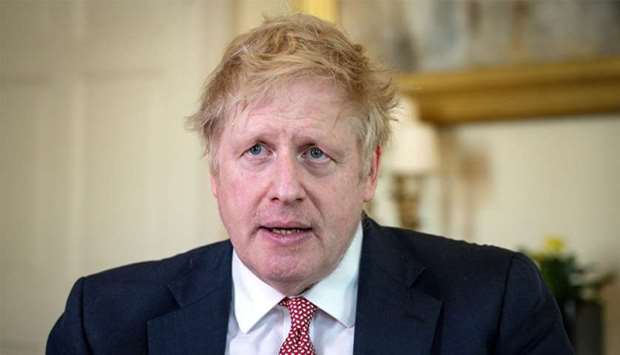* PM Boris Johnson discharged from hospital
* Spent three nights in intensive care with COVID-19
* Daily rise in UK deaths surpasses worst figure from Italy
* Government under pressure over response to outbreak
* Queen issues second rallying message to nation in a week
British Prime Minister Boris Johnson has been discharged from hospital after spending three nights in an intensive care unit being treated for COVID-19 and will continue his recovery at his country home, his Downing Street office said on Sunday.
Johnson, 55, was taken to St Thomas' Hospital in central London on April 5, suffering from persistent symptoms of the disease caused by the new coronavirus. On April 6 he was moved into intensive care, where he remained until April 9.
There has been little public comment from officials into how ill Johnson has been, but his pregnant fiancee Carrie Symonds said on Sunday there had been times in the past week that had been ‘very dark indeed’.
In his first comments since leaving intensive care, Johnson thanked National Health Service (NHS) hospital staff. ‘I owe them my life,’ he said in comments that were released to journalists and confirmed by his office earlier on Sunday.
A Reuters photographer on Sunday saw Johnson and Symonds, who has also suffered from COVID-19 symptoms, being driven out of Downing Street, in central London, with their dog.
‘The PM has been discharged from hospital to continue his recovery, at Chequers,’ the official statement said, referring to the official prime ministerial residence northwest of London.
‘On the advice of his medical team, the PM will not be immediately returning to work. He wishes to thank everybody at St Thomas' for the brilliant care he has received.’
Symonds, 32, posted a series of tweets shortly after Johnson's discharge was announced, thanking staff at St Thomas'.
‘There were times last week that were very dark indeed. My heart goes out to all those in similar situations, worried sick about their loved ones,’ she said. ‘Today I'm feeling incredibly lucky.’
While Johnson has been out of action, his ministers have come under mounting pressure to explain why the national death toll is rising so fast.
Britain has reported two days in a row of hospital deaths increasing by more than 900 people. Friday's death toll of 980 surpassed the highest recorded in a single day in Italy, the hardest hit country in Europe so far.
The death toll in England alone rose to 9,594, officials said on Sunday. The toll for the whole of the United Kingdom, which will be published later, is expected to rise above 10,000.
‘WORST IN EUROPE’?
‘The UK is likely to be certainly one of the worst-affected if not the worst affected country in Europe,’ Jeremy Farrar, director of the health foundation the Wellcome Trust and a member of a scientific panel advising the government, told the BBC.
In a sign of the gravity of the emergency, Queen Elizabeth issued her second rallying message in a week, telling the nation that ‘coronavirus will not overcome us’.
Archbishop of Canterbury Justin Welby, spiritual leader of the worldwide Anglican communion, delivered an online Easter Sunday sermon from the kitchen of his London flat.
Meanwhile, ministers were facing uncomfortable questions about whether the rise in the death toll was due to the relatively late decision to impose a lockdown on March 23. Other European countries imposed strict social distancing earlier.
‘Well, different countries have different cycles in terms of where they are in terms of the spread of this pandemic,’ Business Minister Alok Sharma told Sky News on Sunday.
Health Minister Matt Hancock suggested during a BBC radio interview on Saturday that Britain's daily death toll had exceeded Italy's because it had a bigger population. The UK population is about 66 million while Italy's is 60 million.
When asked why Germany, with a population of about 83 million, had much lower numbers than many countries, he said: ‘The German situation is one I look at a lot.’
The Wellcome Trust's Farrar, who has also advised the German government, attributed the better situation there to much higher levels of testing and early isolation of patients at the start of the outbreak.
Hancock has pledged Britain would be testing 100,000 people per day for COVID-19 by the end of April. Numbers at the moment are much lower than that.
NHS doctors and nurses are complaining not only of insufficient tests but also of about a lack of personal protective equipment (PPE). About 30 frontline medical staff are reported to have died of the disease after treating patients.
Asked on Sunday whether he would apologise over the loss of life due to the lack of PPE, Sharma replied: ‘I said I was sorry for the loss of any life in this pandemic but we are facing an unprecedented situation.
‘We do have a plan, we are putting that in place, we're making sure that there are millions of PPE kits going out to the frontline, and of course we need to be doing even more.’

